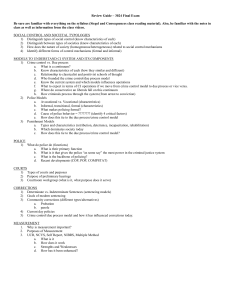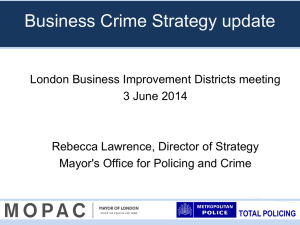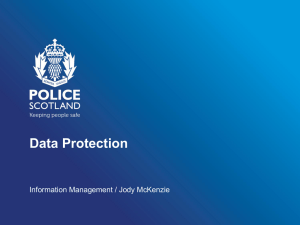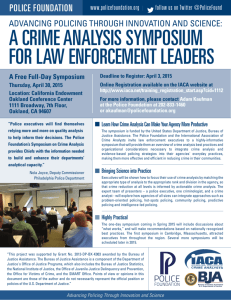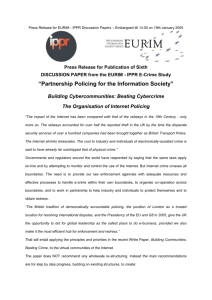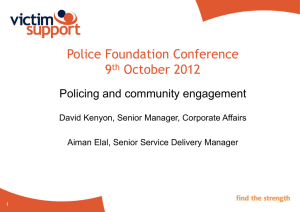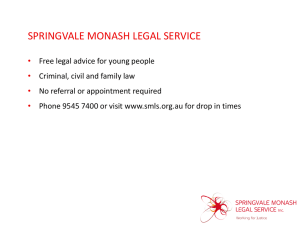STRATEGIC - Queensland Police Service
advertisement
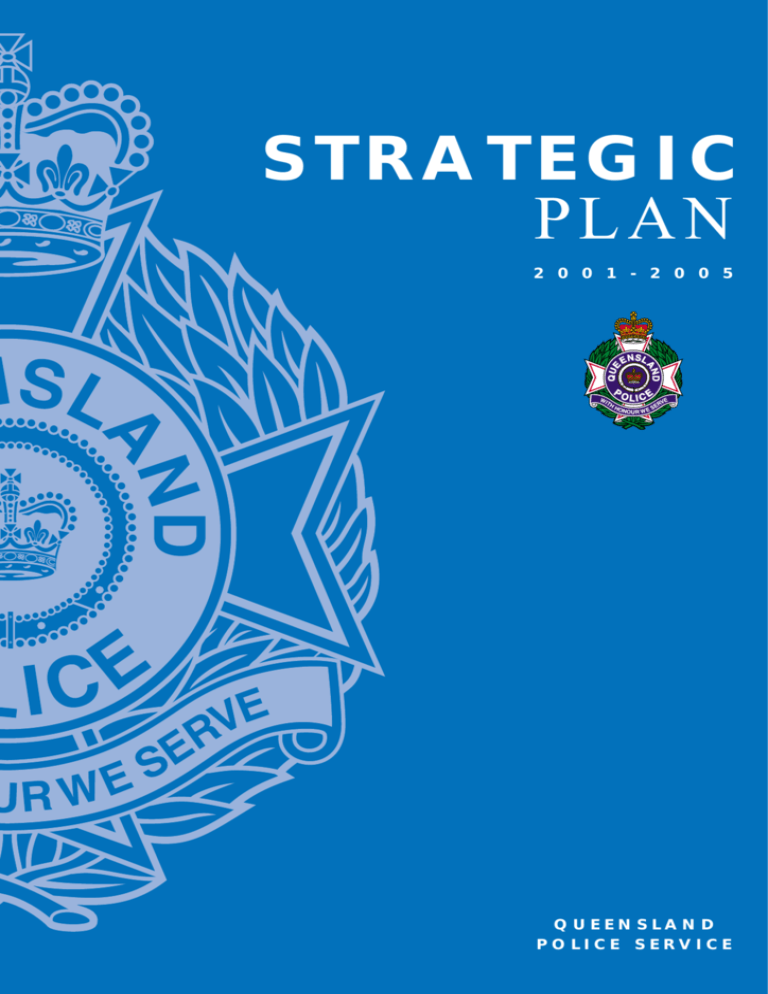
STRATEGIC PLAN 2 0 0 1 - 2 0 0 5 QUEENSLAND POLICE SERVICE COMMISSIONER’S MESSAGE The Queensland Police Service provides a broad range of policing services to the Queensland community. The development of a strategic plan helps to ensure the services it provides continue to be appropriate within a rapidly changing environment. The planning processes which have led to the development of this Strategic Plan have included an environmental scan and extensive consultation. The environmental scan was conducted to identify issues likely to affect policing in Queensland in the future. Focus groups were conducted with members of the community across the State, in urban, provincial and rural areas, to determine key issues. Victims of crime were surveyed to determine how satisfied they are with our performance, and identify how we may improve that in the future. Other surveys identified such issues as the fear of crime, and community priorities for policing services. Data gathered also highlighted the potential impact of major events such as the Goodwill Games, the Commonwealth Heads of Government Meeting (CHOGM) and the Federation of Australia Celebrations. The services delivered by the Queensland Police Service are identified in the Strategic Plan as Outputs. They include: - Proactive, problem-oriented policing (general duties, proactive policing services); - Crime detection, investigation and prosecution (general duties activities including those involving calls for service); - Combating major and organised crime (crime operations and criminal investigations by specialist officers throughout the State, investigating reported and detected incidents of serious crime); - Preservation of public safety (the role of police in preserving public order and safety during civil emergencies); - Traffic policing, speed management and camera operations (proactive and reactive traffic policing operations); - Ethical standards and public accountability (the Queensland Police Service provides to the Queensland community, in accordance with statutory accountability and community information requirements, an open, ethical policing service); and - Corporate support (the administrative, financial, information management and human resource management services, including education and training, required to support the provision of policing services to the community). As we plan for the future, I believe that priority should be given to our performance in five key areas: First is public safety, particularly all matters that police can address that have an impact on the safety of the community we serve. This includes all serious violent crime, the broader category of crimes against the person, road safety, domestic violence and the safety of people in major public spaces. Second, is property offences and car theft. All break and enter offences are serious but the violation of a person’s home is in my view the most serious. A motor vehicle is one of the most significant assets many people possess and its theft is therefore a major loss. Third, is the manner in which we respond to calls for service from the public. The number of calls from across the State is increasing. The Brisbane Police Communications Centre, for example, receives about 50,000 calls each month. Fourth, is our response to planned and unplanned major events and critical incidents. Finally, our attention needs to be focussed on addressing specific local concerns at a division, district or regional level. The strategic planning process provides the opportunity to consider and to address these priorities. I commend this plan to the people of Queensland and all Service personnel. R ATKINSON APM COMMISSIONER MISSION To serve the people of Queensland by protecting life and property, preserving peace and safety, preventing crime and upholding the law in a manner which has regard for the public good and the rights of the individual. VISION STATEMENT We are determined to be a professional police service, dedicated to excellence and committed to working in partnership with the people of Queensland to enhance the safety and security of our community. GUIDING PRINCIPLES ❖ Provide a corruption-free policing service to the Queensland community, based on integrity, fairness, equity, professionalism and accountability. ❖ In partnership with the Queensland community, as well as with other law enforcement agencies, provide responsive policing services to meet the Service’s statutory responsibility to preserve peace and good order and to prevent, detect and investigate breaches of the law by the use of problem-solving approaches. ❖ Help create a safe environment for all Queensland residents and visitors. ❖ Employ effective and efficient management systems which provide maximum support to operational police and all other staff through: - Human resource management practices which value the contribution of all staff members; - Education and training programs which support and enhance the capacities of all staff; and - Corporate management practices which provide the information systems and administrative support structures required to ensure a well-equipped and well-informed Police Service. For more information on strategic planning in the Queensland Police Service please contact the Strategic Development Unit on Telephone Facsimile 07 3364 6870 07 3364 6353 or to view an electronic version of the Strategic Plan visit the QPS Internet site at www.police.qld.gov.au EM DEC QPS MANAGEMENT CYCLE R Y Budget estimates and new intiatives to Finance Committee for review forecasts R/C/D advised of base allocations and special allocations for year Review of QPS Strategic Plan Biennial review of QPS Environmental Scan Review of budget estimates and new initatives by Finance Committee R/C/D Environmental Scans updated QPS Annual Report QPS Statistical Review State-wide Activity Survey L SE Annual Output Performance Review Finance Committee submits findings to Board of Management for consideration A R/C/D operational plans developed Lower level operational plans developed 3rd Quarter Performance Review PR I E PT UA H OCT OB R/C/D advised of any additional funding approved by CBRC from midyear review 2nd Quarter Performance Review State-wide Activity Survey 1st Quarter Performance Review Treasury provided with formal service wide review of performance BR RC ER MB FE Year prior to budget Formats to R/C/D provided for preparation of budget estimates and initiatives Finance Division compiles detailed mid-year submission to Treasury including requests for special funding Monthly expenditure review statements forwarded to Board of Management RY MA ER N O M E V R BE JANUA BER 4th Quarter Performance Review R/C/D provide monthly cash flow forecasts JUNE JULY AU G U S T Budget Cycle R/C/D advised of funding limits for new financial year Beginning/end of financial year AY Performance Review Cycle Finance Division prepares final estimates for Board of Management of anticipated yearly expenditure M Planning Cycle Base allocations for Monthly cash flow forecasts R/C/D adjusted submitted to Treasury to reflect R/C/D advised of personnel changes base allocations for year including special allocations R/C/D = Regions/Commands/Divisions DESCRIPTION Output 1 GENERAL DUTY - PROACTIVE PROBLEMORIENTED POLICING GOAL Employ proactive problem-oriented strategies as part of our overall approach to policing. GENERAL DUTY - CRIME DETECTION, INVESTIGATION AND PROSECUTION • Develop innovative policing responses guided by research, intelligence and other relevant information, and evaluate and share the results throughout the State. • Encourage collaborative partnerships to identify and address community concerns. This output includes the provision of those activities that seek to prevent crime from occurring. Addressing the causes of crime, through a range of proactive initiatives, will help to reduce the level of crime in the community. Output 2 STRATEGIES - The Queensland Police Service will: • Promote community awareness of crime prevention strategies. • Provide a highly visible presence throughout Queensland communities. Effective and efficient detection, investigation and prosecution of crime. COMMON STRATEGIES OUTPUT SPECIFIC STRATEGIES • Provide a timely and appropriate response to incidents. This output includes the provision of general duty activities including those involving calls for service. • Work with the community to detect, investigate and solve crime. • Use information systems and intelligence to respond to crime effectively. Output 3 O U T P U T S COMBATING MAJOR AND ORGANISED CRIME Effective and efficient detection, investigation and prosecution of crime by specialist officers. This output includes crime operations and criminal investigations conducted throughout the State by specialist officers, typically targeting larger scale offences. Output 4 PRESERVATION OF PUBLIC SAFETY This output includes the provision of policing services that preserve public good order and safety during civil emergencies and special events. Output 5 TRAFFIC POLICING, SPEED MANAGEMENT AND CAMERA OPERATIONS ETHICAL STANDARDS AND PUBLIC ACCOUNTABILITY This output includes the provision of services that ensure Queensland has a police service that is fully accountable, well managed and characterised by the professionalism of its members. S U P P O R T CORPORATE SUPPORT The administrative, financial, information management and human resource management (including education and training services) required to support the provision of policing services to the community. • Assist victims and keep them and other stakeholders informed throughout the investigation process. • Work with other law enforcement agencies to monitor and forecast trends and target major and organised criminal activities. • Recruit and train specialist personnel to support investigations. • Target the proceeds of major and organised crime. Maintain peace, order and safety, especially when dealing with planned and unplanned major events and critical incidents. • Train police and community members to respond to disasters and crises, and assist in the management of special events, in conjunction with other agencies where appropriate. • Develop protocols/strategies to reduce the incidence of anti-social behaviour and provide timely and appropriate responses to such incidents. • Conduct appropriate forward planning and allocate suitable resources to manage responses to disasters, crises and special events. • Ensure compliance with government regulations and licensing requirements in the context of public order and safety issues. Promote safe and responsible road use in Queensland. • Work with government agencies and the community to develop and implement road safety education and accident prevention programs. • Work with all relevant stakeholders to identify and respond to identified traffic problems. This output includes the provision of proactive and reactive traffic policing operations, or those activities intended to prevent or detect motorists committing traffic offences. Output 6 • Promote the effective use of technology and evidence gathering techniques in criminal investigations. • Provide targeted traffic enforcement supported by research, intelligence and technological developments. Provide an open, ethical, accountable and professional police service. • Require ethical behaviour of all QPS employees. • Develop high standards for ethical and accountable conduct, identify good practice, train and educate staff and monitor performance. • Ensure a timely, measured and consistent response to potential, alleged and actual inappropriate behaviour, and support witnesses who identify such behaviour. • Provide accurate and timely information, where appropriate, in respect of requests for information from Government, Parliament and the community. Support the provision of policing services to the Queensland community. • Enhance the development and integration of planning, budgeting, policy development, operational and risk management within the Service. • Effectively and efficiently allocate and utilise its resources. • Employ good practice in the recruitment, selection, initial training and induction of all personnel, and human resource management practices that support all staff. • Provide educational and training programs that increase the skills of all staff. • Provide information and administrative services to ensure a well equipped and well informed Police Service. • Through the use of media and public relations initiatives, promote awareness of the Service internally and externally. • Provide facilities to support and enhance the conduct of policing services. PERFORMANCE INDICATORS - The Queensland Police Service will monitor its performance in terms of: - Percentage of time directed toward proactive, problem-oriented policing. - Number of hours QPS personnel spent on proactive, problem-oriented policing. - Number of hours QPS personnel spent performing patrols. - Percentage change in the rate/number of reported offences: (1) Personal Safety, and (2) Property Security. - Rate of unreported offences. - Victimisation rate. - Narrative summary of key problem-oriented policing initiatives by relevant output.* - Levels of community satisfaction with police. - Satisfaction with police support for community programs. - Perceived level of personal safety and property security. COMMON PERFORMANCE INDICATORS - Total number of offences reported: (1) personal safety, and (2) property security. - Number of offences reported and cleared within the period: (1) personal safety, and (2) property security. - Total number of cleared offences: (1) personal safety, (2) property security, and (3) drug. - Perceived level of personal safety and property security. - Rate of unreported offences. - Victimisation rate. OUTPUT SPECIFIC PERFORMANCE INDICATORS - Percentage of time directed toward general duty - crime detection, investigation and prosecution. - Number of hours QPS personnel spent on general duty - crime detection, investigation and prosecution. - Number of crime related calls for service. - Number of domestic violence incidents investigated.* - Domestic violence breaches – number reported and cleared.* - Percentage of successful prosecutions (vs number of failed prosecutions).* - Public satisfaction with initial police response. - Percentage of time directed toward combating major and organised crime. - Number of hours QPS personnel spent on combating major and organised crime. - Success of drug operations (eg number of offenders charged, amount of drugs seized, value of proceeds seized, number of laboratories closed).* - Proceeds of crime seized - pecuniary penalty orders, forfeiture orders.* - Public satisfaction with police response from specialist officers. - Percentage of time directed toward preservation of public safety. - Number of hours QPS personnel spent on preservation of public safety. - Number of calls for service related to the preservation of public safety. - Number and rate of good order offences detected. - Public perception of safety. - Public satisfaction with police dealing with public order problems. - Public perceptions of local issues impacting on public order and safety. - Percentage of time directed toward traffic policing, speed management and camera operations. - Number of hours QPS personnel spent on traffic policing, speed management and camera operations. - Number of calls for service related to traffic. - Number of officer hours spent on targeted traffic operations. - Number of hours officers spent on Breath Testing. - Number of hours officers spent on speed enforcement by devices other than Speed Cameras. - Number of hours Speed Cameras are deployed. - Rate of detection of offences by the Speed Camera Program and the Red Light Camera Program. - Number of life endangering offences detected (excluding Drink Driving offences). - Number of traffic related offences (not including Traffic Infringement Notices). - Number of Traffic Infringement Notices. - Number, and rate per licensed driver, of breath tests conducted. - Number of drink driving charges. - Ratio of breath tests to charges. - Number and rate of road crash fatalities by crash causal factor. - Number and rate of reportable crashes by crash causal factor. - Level of compliance with road safety initiatives by road users. - Number and rate of hospitalisations. - Number of hospitalisation crashes. - Percentage of time directed toward maintaining and promoting ethical behaviour and public accountability. - Number of hours QPS personnel spent on maintaining and promoting ethical behaviour and public accountability. - Number of, and changes in, complaints against police per 1000 officers. - Public perception of police professionalism and image. - Number of Ministerial briefings and items of correspondence. - Percentage of time directed toward corporate support. - Number of hours QPS personnel spent on corporate support. - Number and type of personnel. - Amount and type of training received by QPS personnel. - Employee Satisfaction: (1) Sick leave – Percentage of time lost, (2) Worker’s compensation payouts: number and cost, and (3) Job satisfaction (ie levels of stress and morale). - Number and type of personnel separations. - Degree to which areas over/under spend their allocated budget (ie operating expenses by Region/Command). - Liability costs for failed prosecutions. - Equal Employment Opportunity (EEO) target achievements. - Client satisfaction with support services. *These indicators require further development and/or review of collection methods
